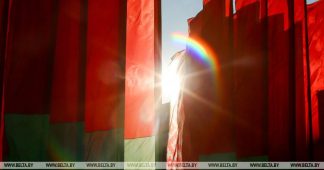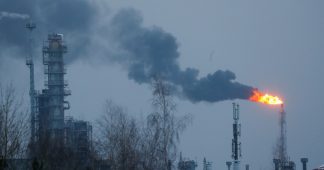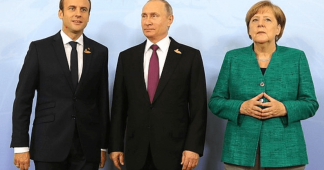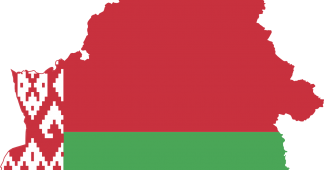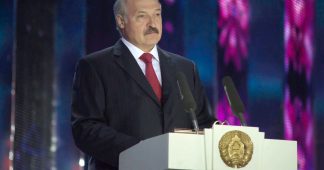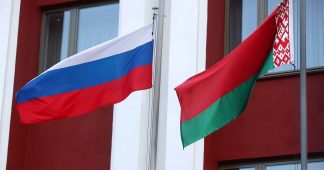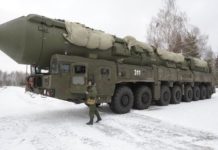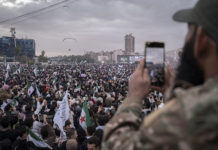By Gracjan Cimek,
Professor, Political Science,
International Relations, Polish Naval Academy, Gdynia, Poland
The era of Western domination and US hegemony is over. The main factor of change is the so-called a counter-hegemonic alliance between China and Russia that cemented the idea of a “great Eurasian partnership”. Since 2015, it has been filled with a targeted synthesis of the Eurasian Union and the Chinese “Belt and Road Initiative”, referred to as the New Silk Road. The Shanghai Cooperation Organization and the BRICS are working for a new, just international order. The US wants to oppose this objective tendency at all costs. Hence, a new type of hybrid war unleashed in defense of the already lost hegemony which had its next stage in Belarus in August 2020. This relatively small Slavic state is characterized by three attributes that make it a unique entity.
The first is to preserve — as the only state after the collapse of the USSR — the elements of socialism; the absence of oligarchy, great income inequalities, the possession of state ideology and traditional morality; 43% of working Belarusians are employed in the state economic sector. State-owned enterprises account for over 70% of the country’s industrial production. There are approximately 3,000 companies worth 120-150 billion USD, including the world’s leading plants for phosphorus, nitrogen, trucks and tractors. Then there are modernized kolkhozes. Thus, the Belarusian economic model contradicts the neo-liberal dogma of the alleged superiority of private ownership over social ownership.
The second attribute is the commitment to Eurasian integration, and above all the creation of a Union State with the Russian Federation, which makes Minsk Moscow’s greatest ally among the post-Soviet states. This prevented the closing down of the western “sanitary cordon” around Russia. Both countries form a common security space, hence in Belarus there is a radar station in Hancewicze near Baranavichy (Brest Oblast), which covers a distance of almost 5,000 km to the west and is the core of the warning system against a missile attack directed to Russia. In turn, in Vileyka (Minsk Oblast) there is the 43rd Naval Communication Center, securing communication with Russian ships around the world.
Finally, the third attribute is Minsk’s commitment to China’s New Silk Road and very good relations with Beijing. China can increase the effective sovereignty of smaller states by recognizing itself as a representative of the “Global South”. This is also what they are doing in their relations with Belarus, which has large and good Chinese investments and favorable loans. In this way, Minsk was able to balance between Russia and the EU in the pursuit of effective sovereignty. This strong need for independence is also demonstrated by the fact that the Republic of Belarus has been a member of the Non-Aligned Movement since 1998.
Considering the current situation, one should also take into account the attitude of Belarus in the struggle against Covid-19, which has not imposed a health regime on the population and is doing much better than most Western countries. It is meaningful that no one was punished for protests without masks. As if that were not enough, the president said that the International Monetary Fund (IMF) approached him by offering 950 million USD for the lockdown. Lukashenko, therefore, exposed himself to the interests of global pharmaceutical corporations, asking about the behavior of other leaders who, by surrendering to WHO, led to a multidimensional crisis in their countries.
The course of the “color revolution” is always similar: at the beginning, the opposition does not recognize the results of the elections, and then not only demonstrations may appear, after all, there is no lack of potential for protest today in any country, and finally, there are always victims among the protesters. The next step is the information, psychological, diplomatic and economic pressure from the West. And so it happened this time.
The first events took place on the night of August 9, 2020, when the preliminary results of the presidential elections were announced, according to which the incumbent president Alyaksandr Lukashenko won 80.1% of the vote, and the opposition candidate Swiatłana Cichanouska won 10.12%. In response, protests began followed by strikes. Hundred thousands of people went down to the streets expressing their opposition to the elections and their outcome they considered unfair. Protesters claimed that the governing president gained only 10% and Cichanouska almost 90%. According to reliable sources, the result was 66% for Lukashenko and 33% for the rest, but the Minsk capital city’s results were 50/50%. Why, however, having an advantage, Lukashenko had to false the results at 80%?
In response to the protest, president ordered the striking state enterprises to be closed down. To date, many thousands have been arrested, and few opposition activists have been forced to leave the country. He also mobilized the army to full combat readiness and warned against NATO actions near the Belarusian border with Poland. The protests took a rather unusual character, combining opposition from various social groups, which also indicates objective reasons for the activity. In developing of this crisis it is worth to identify three aspects.
Firstly, economic: after the development of the first decade of the 21st century, Belarus’ finances suffered from the weakening of the ruble in 2011. Its economy, which accounts for half of its foreign trade turnover in Russia, decelerated sharply, along with the problems of its eastern neighbor’s economy squeezed in 2014 by US and European Union sanctions. However, even before the outbreak of the coronavirus pandemic earlier this year, Belarus was already experiencing a recession.
The second flashpoint was geopolitical in nature. Since 2014, Lukashenko has played a game with superpowers to avoid the Ukrainian scenario, in which “democracy” and “the revolution of dignity” won, but in fact the Ukrainian nation became poorer and is looking for employment all over Europe; also GDP per capita is lower than that of Belarus. The success of the president is the fact that he organized the Minsk format, in which the leaders of Germany, France, Russia and Ukraine negotiated a solution to the Ukrainian crisis.
Third condition that led to explode the crisis is the fact that the scale of protests was influenced by social changes. In Belarusian system, appeared few oligarchs. There are also more than 7 thousand people of USD millionaires, however, only 0.1% of the population began to identify with the transnational business elite. The engine of the Belarusian protests, however, was a new creative class — specialists in information technology (IT), consisting of approximately 100,000-120,000 persons, mainly men. This modern industry, launched thanks to the president, generates 5% of economic growth. The new class, living in a new, virtual world of numbers, although it earns well, wants a new state model and a different styles of political life. Lukashenko does not suit these ideas anymore. So we can talk about the “prodigal son syndrome”. The creeping hipster revolution involves people who are americanized, cosmopolitan, fully employed, and therefore not really interested in politics. After all, the potential for rebellion tends to increase due to economic deprivation and social problems, not the other way around! This generation is also the result of civilization changes: fast movies, fast cars, rushing commercials, dynamic of sports, pursuit of money; hence: stimulation and inability to concentrate based on logic, truth and rational discussion. The one-person political system of 26 years does not fit this psycho-social dynamic. This is the Hegelian spirit of the time.
Not accidentally, the so-called opposition mobilized masses to speak out against the president, concealing goals that they wanted to pursue after taking power in the state. They are: joining NATO and breaking with Eurasian integration; linguistic nationalism similar to that in Ukraine (despite the fact that 80% speak Russian on a daily basis); the most important: liquidation of state-owned enterprises and replacing them with small and medium-sized businesses, which would absorb 300 thousand, new unemployed. The symbolic expression of this attitude was the use of the pre-1994 white-red-and-white flag instead of the current flag in use officially since 1994. In fact, we can speak of attempts to bourgeois counterrevolution. This is also confirmed by the biographical profile of the main opposition activists.
Valery Cepkało is a former Belarusian ambassador to the US, a friend of the Clinton administration, a former associate of Lukashenko and the administrator of the Belarusian silicon valley, whose wife, Valeria Cepkało represents the American corporation Microsoft in 12 post-Soviet countries. On the other hand, the candidate, Viktor Babariko, was previously the director of the Russian Gazprom’s daughter company, which suggests that there are also oligarchs on the Russian side interested in a change of power in Belarus, which will favor the interests of the Russian oligarchy. The main rival, Swiatłana Cichanouska, fully revealed the goals she serves, meeting the Bernard-Henri Levy — an ideologist of neoliberalism and a promoter of the color revolutions.
From the perspective of the current Belarusian government, the main external actors who sought to change it were US customers in the region: Poland, Lithuania, Ukraine. Under Trump, the US tried to stay at the back. There are also indications that Great Britain plays an important role in the organization of the protests. It is no accident that the Belsat propaganda television is financed jointly by the Polish and British budgets. An important role in mobilizing the protesters is played by the Belsat Nexta (channel on Telegram and YouTube), which not only publishes instructions for the protesters, but also conducts disinformation campaigns.
At this stage, the “color revolution” scenario has been stopped. Russia turned out to be a real ally. Congratulations on Lukashenko’s victory were given by a number of countries. He was the first to be the leader of the PRC, Xi Jinping, as well as the presidents of Russia Vladimir Putin, of Turkey Recep Tayyip Erdogan and many others. Representatives of the European Union and the USA stated that they did not consider the presidential elections fair and appealed to the Belarusian authorities to remake the vote.
A question arose: why the West usually wins in color revolutions? Why by waging hybrid wars it can win the minds and hearts of the masses and control them from the outside? The answer should be sought in the systemic attractiveness. While the USSR had an integrating ideological vision and social transformation, capitalist Russia does not; in fact Moscow cannot even count on military aid in The Collective Security Treaty Organization. Therefore the main question about a future is: what direction will Russia go? However, the president Putin’s speech in Davos in early 2021 suggests that it could be a new form of socialism.
Belarus can play an important role in this endeavor. After stabilizing his power, Lukashenko admitted that socialism and the restriction of private ownership would allow better for social development; Elena Veduta claims that Belarus is the first state that could introduce cybernetic management of the planned economy as a condition for building a new socialism. However there should be the second condition for change: development of a new utopia creating a cultural perspective attractive especially to young people, who now remain in the grip of capitalist hegemony, often fighting for empty, emotional slogans, which may, in effect, destroy their state. In response to the processes of delegitimization, Lukashenko also began the processes of constitutional reform, realizing that the authoritarian style of government contradicts the growing subjectivity of individuals and social groups.
In conclusion it is worth remembering, however, that the indicated changes are facing a resistance in relation with the current geopolitical rivalry, and especially to the increasingly desperate defense of hegemony by the US. Due to this threat, Minsk has announced that it probably will give up its policy of non-alignment and join the anti-Western alliance, the axis of which could seem to be Russia-China and Iran.
